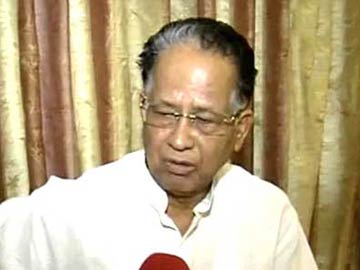A group of people are seen drinking liquor
in one of the many clandestine establishments which sell alcohol in
Dimapur. Photo by Caisii Mao
By Imti Longchar
Dimapur, Aug 19 : Amidst
zealous and earnest debates flooding newspapers, social networking
sites and road side liquor joints on the fallacy that Nagaland Liquor
Total Prohibition Act (NLTP) 1989 is or not, a less perturbed illicit
liquor industry continues to rise to humongous proportions in commercial
hub Dimapur.
Under the guise of mineral water wholesale shops and patently placing them under food restaurant industry on their registration licenses, the spurious liquor business is rising extraordinarily in all stretches of Dimapur.
Keen observers point out how the commercial hub might have the highest number of wholesale shops selling mineral water in the whole of North East, coupled with an abnormal number of Indian cuisine hotels - most of which does not offer even a plate of chapatti. More ironically, amongst all the businesses dotting Dimapur, these shops are diligently the first to open shutters in the morning (by 5 am), and the last to close at night (11 pm) for its ‘customers.’
People in the know (and who does not know?) counted nearly 500 illegal wine shops in Dimapur and along NH 29 and rising. This figure does not include restaurants which have liquor on their menu, or home/residence based IMFL businesses inside the numerous colonies.
To cite instances, a year or two ago, there was only one wine store, a very renowned one, near Dhobi Nullah traffic point intersection. Of late, it has tripled, flanking each other on the left and right of the road.
Or along the neglected Signal road, where setting up business was deemed a bad idea (except for a Punjabi hotel prospering in mineral water business) because of the deplorable road condition or so, nearly half a dozen wine stores have cropped up and is doing brisk business.
Likewise, be it City Tower, Nagarjan junction, Purana Bazaar, Burma Camp, 4th Mile and elsewhere, the sprouting liquor hotels with its trademark mineral water cartons and cold drinks decorated cupboards can hardly miss our sight.
THE EARNINGS
Lure of quick and highly dividend earnings and unemployment can be attributed for people venturing into the illicit liquor business, despite the knowledge of prohibition. No regard for the law because everyone else is breaking the law of prohibition can be another issue.
Owner of a paan shop cum liquor joint was candid enough to reveal how one can become a ‘lakhpati’ if one lasts a year into the business. “After that, its snapping fingers for you,” he quipped. His bold declaration holds water.
A personnel of the Intelligence Branch revealed how during one of the recent routine closure of liquor stores by authorities, a single wine shop could earn a whopping profit of Rs 16 lakh by selling liquor to alarmed imbibers from 4 pm till 9 pm.
THE GANG
The stretch of Shillong and Guahati night bus boarding station (Blue Hill station) decorated with high rise hotels, lodgings, and bus counters is infamous for its alleged distinction of being a ‘syndicate’s haven,’ – meaning a hotspot from where most networking of illicit liquor supplies allegedly originate.
A source, working in the police department explains how the illegal chain of the liquor industry is segregated into four components – syndicate, whole-seller, retailer and home business makers. Syndicates are the main suppliers to the whole-sellers, who, then sell to retailers and home business makers.
Illicit liquor is also supplied directly by kingpins at Lahorijan and Khat Khati under Assam which, according to this source, is more cumbersome and risky for the bootleggers.
One key factor on how syndicates manage to operate the illicit liquor business full swing may also be directly linked with the license awarded by the State government to individuals or groups for bonded ware house to supply liquor to Armed forces stationed in Nagaland and Manipur, says the source.
With these licences, purportedly bought with ludicrous amounts of bribes landing in the hands of syndicates, trucks after trucks of liquor enter Nagaland gate unrestrained. These consignments not only go to the Armed forces, but flows directly into the general market, the source claimed.
“But who can prove what when everyone- the excise, police, State government officials, politicians, church members, public- from the top rung to the bottom, are equally involved in the making of this industry?” he said, implicitly pinpointing the reason why the NLTP Act has not been a success or will never be.
NEW BREED OF LOCAL BREWERS
The roaring illicit liquor industry in Dimapur has also witnessed the rise of a new breed of apprentice in the brewing business. There was a time when local beer made of rice were mostly brewed and sold by local women as means to survival and livelihood. And also with their contention that drinking rice beer was Naga traditional way of life.
A walk around Westyard (Rail bazaar) area or Dhobi Nullah would reveal otherwise. At the bustling stretches of rice beer joints, swift and business minded non locals sell local brew kept in large basins along with plates of dry fried fish, fried blood cakes, mutton heads and innards.
Many of these versatile non local businessmen have learnt the art of brewing rice beer as means to employment. They also buy the fermented rice from locals.
In a reverse scenario, local women mostly widows or those with unemployed husbands have turned to sale of IMFL instead of the local brew. “This is more lucrative and hassle free than selling rice beer,” a woman who was into rice beer business, but now sells rum, remarked.
That’s prohibition in Dimapur.
Source: Morung Express













